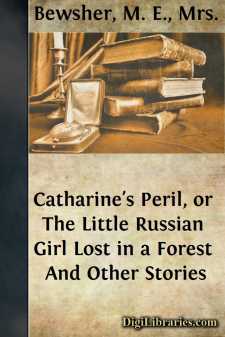Categories
- Antiques & Collectibles 13
- Architecture 36
- Art 48
- Bibles 22
- Biography & Autobiography 813
- Body, Mind & Spirit 142
- Business & Economics 28
- Children's Books 17
- Children's Fiction 14
- Computers 4
- Cooking 94
- Crafts & Hobbies 4
- Drama 346
- Education 46
- Family & Relationships 57
- Fiction 11829
- Games 19
- Gardening 17
- Health & Fitness 34
- History 1377
- House & Home 1
- Humor 147
- Juvenile Fiction 1873
- Juvenile Nonfiction 202
- Language Arts & Disciplines 88
- Law 16
- Literary Collections 686
- Literary Criticism 179
- Mathematics 13
- Medical 41
- Music 40
- Nature 179
- Non-Classifiable 1768
- Performing Arts 7
- Periodicals 1453
- Philosophy 64
- Photography 2
- Poetry 896
- Political Science 203
- Psychology 42
- Reference 154
- Religion 513
- Science 126
- Self-Help 84
- Social Science 81
- Sports & Recreation 34
- Study Aids 3
- Technology & Engineering 59
- Transportation 23
- Travel 463
- True Crime 29
Catharine's Peril, or The Little Russian Girl Lost in a Forest And Other Stories
by: M. E. Bewsher
Description:
Excerpt
In the year 1812, Napoleon Buonaparte, after conquering nearly the whole of Europe, invaded Russia, and led his victorious army to Moscow, the ancient capital of that country. Soon this city, with its winding streets, its hills, its splendid churches, its fine houses and cottages so mixed together, its corn-fields, woods, and gardens, as well as the Kremlin, consisting of several churches, palaces, and halls collected on the top of a hill and surrounded by walls, fell into the power of the French.
Rostopchin, the Governor, impelled by bigoted patriotism, resolved to set fire to the city confided to him by his imperial master Alexander, the Czar of all the Russias.
It was truly a heart-rending sight to witness the misfortunes of the inhabitants, forced to quit their homes to escape a horrible death.
The provisions stored in the granaries and other places were consumed in the flames.
The conflagration lasted about ten days, until almost the whole of Moscow was laid in ashes. The main body of the Russian army had retired towards Tula, and taken up a strong position on the road leading towards that town, in order to prevent the French from advancing into the interior of the country. Thus they were hemming them in on all sides, only leaving them the choice of being starved or burned, or returning by the way they had come, and wintering in Poland. This latter expedient might have saved the army had it been adopted in time.
The terrible Cossacks, first-rate riders, with lances ten feet long, and a musket slung over their right shoulder, were swarming around everywhere, and annoying the French outposts, cutting off the foraging parties, and hindering them in their attempt to penetrate into the south of Russia, where they would have found plenty of provisions for the winter.
Winter was fast coming on—a Russian winter, in all its bitter severity. The snow began to fall, the rivers to freeze, and crows and other birds died by hundreds.
God had sent His frost, and of the 400,000 enemies who had entered Russia, but very few lived to behold again their native land.
Amid the confusion and panic that prevailed in the burning city, Catharine Somoff, the little daughter of a Russian merchant, had been separated from her relations and friends, and to her dismay found herself alone in the crowd.
The weather was intensely cold. Forsaken and half frozen, the child wandered up and down, not knowing where to find shelter. Both her parents had mysteriously disappeared, and it seemed as if no one would claim her. So passed the long hours of the night; and at the dawn of day, Catharine, worn out by fatigue, cold, and hunger, fell down in front of a church which the flames had not yet reached, hoping to go to sleep.
Sleep soon comes to childhood; and, without doubt, this poor child, exposed to such a temperature, would never have unclosed her eyes any more in this world, had not a sutler's wife providentially come to fix up her little provision market near this church, and, noticing the lonely one, felt womanly compassion for the desolate, unprotected Catharine. This humane French-woman took all possible care of her—indeed, treated her as her own child, and by degrees the young Muscovite, thus rescued from an untimely death, grew to love her protectress with all the strength of her affectionate nature.
Meantime the French army had commenced its retreat, and the sutler's wife had to leave Moscow.
Were M. Somoff and his wife alive, or had they perished, like numbers of their fellow-countrymen, by famine or by fire, or amid the numerous ills of a captured city?...


